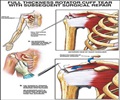A new study has found that a controversial shoulder surgery, known as arthroscopic surgery, can successfully benefit young, athletic, first-time shoulder dislocation patients in the long term.
A new study has found that a controversial shoulder surgery, known as arthroscopic surgery, can successfully benefit young, athletic, first-time shoulder dislocation patients in the long term.
The study conducted by Major Brett Owens, MD, of Williams Beaumont Army Medical Center in El Paso, Texas, also found that surgery had an upper hand on conservative methods, in yielding excellent results for highly active patients.“In young, active patients, there were statistics as high as 92 percent that they would dislocate their shoulder again when conservative approaches like rest and immobilization in a sling were used. If we had an operation with a 90 percent failure rate, we would abandon the procedure. My thought was, why should we embrace a treatment with such a high failure rate,” said Robert A. Arciero, MD, of the Keller Army Hospital in West Point, NY.
Since 1993, Arciero had started performing arthroscopic surgery on young military cadets who suffered their first shoulder dislocation. While the short-term results were found to be excellent, it was unknown how these patients would fare over the years.
“We decided to examine these patients’ long-term results. We found that these patients maintained their health and active lifestyle. Surgery for this group of patients was durable and provided excellent shoulder function and a high activity level even after 10 years,” said Owens.
The researchers examined 39 patients (40 shoulder operations) and observed their average follow-up to be 11.7 years. They evaluated the patients with patient-derived outcomes measures and asked to compare their repaired shoulder to its function level pre-injury and if they would be likely to have the surgery again. Besides, they were also physically examined with a number of tests, including, how many push-ups they completed in two minutes and performance on the Army Physical Fitness Test.
On the whole, it was found that the patients maintained excellent use of their shoulder. The mean American Shoulder and Elbow Surgeons score was 90.9. The patients compared their repaired shoulders’ function to the pre-injury function.
Advertisement
In terms of athletic ability, it was found that the average number of push-ups performed in 2 minutes was 72.8 as against 77.7 prior to their injuries. Also the mean score of the Army Physical Fitness Test was found to be 282.2 out of a possible 300.
Advertisement
“Certainly our study proves that for this group of patients, young, athletic cadets unable to modify their activity level, arthroscopic surgery for first-time dislocations is successful both short and long-term. This treatment allowed our patients to return to sports, graduate from the military academy and engage in active duty military obligations. It may not be the approach that should be taken for a person who lives a sedentary lifestyle, but this could be applicable to the young, 15-25-year-old athlete, who is at high risk for recurrent instability and compromised function,” said Dr. Owens.
The study was released at the 2008 American Orthopaedic Society for Sports Medicine Specialty Day at The Moscone Center.
Source-ANI
SRM/K








